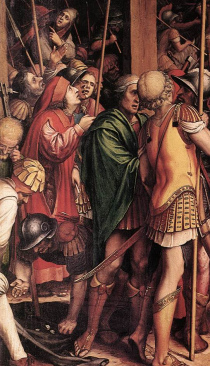The tradition of casting lots is referenced several times in the Bible. A variety of objects were used to cast a lot, depending on the place and local customs, such as coins, polished sticks, cards, dice, and so on. We today carry out a form of this ancient custom whenever we throw a dice or flip a coin.
Biblical Examples
Aaron, and the other High Priests that followed him, cast lots on the Day of Atonement (Yom Kippur) to determine one goat to represent the Lord and another to represent "Azazel" (Leviticus 16:8, 10, 26).
The Promised Land was divided up by lots (Joshua 18:6).
King David used lots to divide up, in twenty-four courses, the priestly responsibilities given to the descendants of Aaron the High Priest (1Chronicles 24). This method of selection was also used to divide up the classes or divisions that would be presided over by musical leaders in God's temple (1Chronicles 25).

Nehemiah used lots to determine who carried the wood used to burn upon the altar at Jerusalem's temple (Nehemiah 10:34).
Jonah, after God commanded him to preach in Nineveh, tried to avoid carrying out this task. The ship he used to run from the Lord quickly ran into a storm and was in jeopardy of breaking up. Those on the ship used lots to determine it was Jonah and his behavior that put their lives at risk! The wind and waves, after the prophet was thrown into the sea, finally turned calm (Jonah 1).
Reasons for Using It
The primary reason for performing this act was to render an impartial, unbiased decision on important matters. Once the lot was cast, no one could argue that the decision was the result of human intervention like nepotism, politics, favoritism, and so on.
What is particularly significant is the fact that, in ancient Israel, the High Priest used from time to time the tradition of casting lots for important decisions. It amounted to consulting God for an answer as is confirmed by the book of Proverbs.
The lot is cast into the lap, but the whole disposing of it is from the Lord (Proverbs 16:33, HBFV).
This impartial practice stops arguments and contentions between people (and no doubt could prevent them from occurring in the first place). In this regard Proverbs states the following.
Casting lots causes contentions to cease, and keeps the mighty apart (Proverbs 18:18).
The Last Use
The last recorded use of casting lots in the Bible is in Acts chapter 1. It occurred when the early church, knowing they needed someone to replace Judas Iscariot as an apostle, asked for God to select one of two men for the awesome responsibility of preaching the gospel.
Then they cast their lots; and the lot fell on Matthias, and he was numbered with the eleven apostles (Acts 1:26, HBFV).
Humans, for countless ages, have used mediums, readers of cards, palm readers and so on to help them make decisions and plan for the future. God condemns, as made abundantly clear in Deuteronomy 18, these occult practices.
There is nothing wrong, however, with a modern version of casting lots like flipping a coin to arrive at a decision or determine a winner. When done, however, it is important to remember that chance produces the outcome with no additional meaning attached to it.